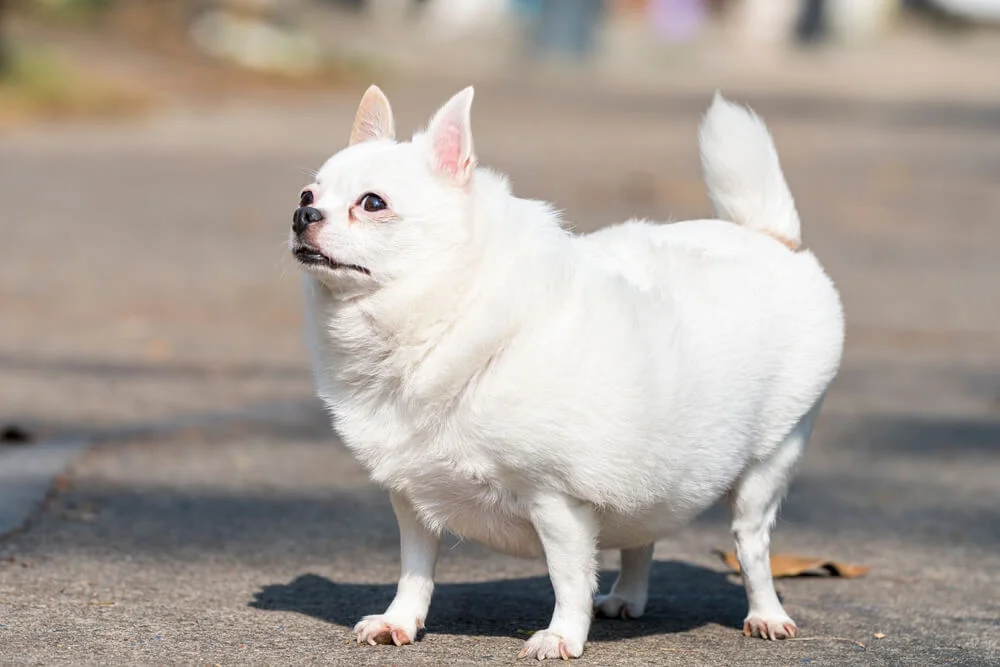Did you know that a chihuahua can become overweight just like humans? It may come as a surprise, but these pint-sized pups are at risk of packing on the pounds if their diet and exercise are not properly managed.
As a chihuahua owner, I know how important it is to understand what is considered overweight for this breed. Chihuahuas have a small frame and are prone to gaining weight easily. The ideal weight for a chihuahua can vary depending on their age and size, but generally, a healthy chihuahua should weigh between 2 to 6 pounds. Anything above this range could be considered overweight and may lead to a range of health problems, including joint issues, heart conditions, and decreased overall quality of life. To ensure your chihuahua stays within a healthy weight range, it is crucial to provide them with a balanced and portion-controlled diet, along with regular exercise such as walks or playtime. By keeping their weight in check, you can help your chihuahua live a happier and healthier life.

What is Overweight for a Chihuahua?
Chihuahuas are one of the smallest dog breeds, known for their tiny size and big personalities. However, just like humans, Chihuahuas can also struggle with weight issues. Understanding what is considered overweight for a Chihuahua is crucial for their overall health and well-being. In this article, we will explore the topic of Chihuahua weight, the risks of obesity, how to determine if your Chihuahua is overweight, and the steps you can take to help them maintain a healthy weight.
The Ideal Weight Range for Chihuahuas
Every Chihuahua is unique, and their ideal weight can vary depending on factors such as age, sex, and overall health. However, in general, a healthy adult Chihuahua should weigh between 2 and 6 pounds (0.9 and 2.7 kilograms). It’s important to note that these numbers are just a guideline, and some Chihuahuas may naturally fall outside of this range without it indicating a weight problem.
When determining if your Chihuahua is at a healthy weight, it’s essential to consider their body condition. You should be able to feel their ribs with a slight layer of fat covering them, without them being visible. Additionally, when looking at your Chihuahua from above, you should see a slight waistline behind the ribs.
If your Chihuahua falls outside of this ideal weight range or their body condition is significantly different, it may be an indication that they are overweight or underweight. In these cases, consulting with a veterinarian is recommended to evaluate their overall health and determine a proper weight management plan.
The Risks of Obesity in Chihuahuas
While a few extra pounds on a Chihuahua may seem harmless, obesity can lead to various health problems and significantly reduce their quality of life. Some of the risks associated with obesity in Chihuahuas include:
- Joint Problems: Excess weight puts additional stress on the joints, increasing the risk of conditions such as arthritis and hip dysplasia.
- Heart Disease: Obesity can strain the heart and lead to cardiovascular issues.
- Diabetes: Overweight Chihuahuas are more prone to developing diabetes, which requires lifelong management.
- Respiratory Issues: Carrying extra weight can make it difficult for Chihuahuas to breathe properly and may lead to respiratory problems.
- Shortened Lifespan: Studies have shown that obesity can significantly reduce a dog’s lifespan, cutting precious years from their life.
By understanding the risks associated with obesity, you can take the necessary steps to prevent and manage weight issues in your Chihuahua.
Determining if Your Chihuahua is Overweight
Identifying if your Chihuahua is overweight requires a combination of visual observation and hands-on assessment. Here are a few signs that may indicate your Chihuahua is carrying excess weight:
- Lack of Visible Waist: Instead of a defined waistline, an overweight Chihuahua may have a straight or rounded appearance from the chest to the hindquarters.
- Inability to Feel Ribs: If you can’t feel your Chihuahua’s ribs due to a thick layer of fat, they may be overweight.
- Difficulty Walking or Exercising: Excess weight can make physical activities challenging for Chihuahuas, causing them to tire quickly or struggle to move.
- Labored Breathing: If your Chihuahua seems to pant excessively or has difficulty breathing, it may be a result of being overweight.
- Behavioral Changes: Aches and pains associated with obesity can lead to irritability, decreased energy levels, and overall changes in behavior.
If you notice any of these signs in your Chihuahua, it’s important to consult with a veterinarian. They can perform a thorough examination and provide guidance on weight management through diet and exercise.
Managing Weight in Chihuahuas
If your Chihuahua is diagnosed as overweight or at risk of becoming overweight, there are several steps you can take to help them achieve a healthier weight:
- Dietary Adjustments: Work with your veterinarian to create a balanced and portion-controlled diet for your Chihuahua. Avoid excessive treats and table scraps.
- Regular Exercise: Engage your Chihuahua in daily physical activities such as walks, playtime, and interactive toys. Gradually increase exercise duration and intensity to avoid strain or injury.
- Weight Monitoring: Regularly weigh your Chihuahua and record their progress. This will help you track their weight loss and adjust their diet and exercise routine accordingly.
- Environmental Enrichment: Provide mental stimulation and environmental enrichment to prevent boredom and reduce the likelihood of overeating out of boredom.
- Veterinary Guidance: Regularly visit your veterinarian for check-ups and consultations. They can monitor your Chihuahua’s progress and provide personalized advice based on their specific needs.
By implementing these measures and ensuring consistent commitment, you can help your Chihuahua reach and maintain a healthier weight, improving their overall well-being and longevity.
Summary
Understanding what is considered overweight for a Chihuahua is essential for their health and happiness. While every Chihuahua is unique and may have slightly different ideal weights, it’s crucial to monitor their body condition and consult with a veterinarian if there are concerns. Obesity in Chihuahuas can lead to various health risks, including joint problems, heart disease, diabetes, respiratory issues, and a shortened lifespan. By actively managing their weight through proper diet, regular exercise, and veterinary guidance, you can ensure your Chihuahua maintains a healthy weight and lives a long, happy life.
Key Takeaways: What is overweight for a chihuahua?
- Chihuahuas are prone to obesity, so it’s important to monitor their weight.
- An overweight chihuahua is generally considered to be one that exceeds the breed standard weight of 2 to 6 pounds.
- Weight gain in chihuahuas can lead to health problems such as joint issues and heart disease.
- A balanced diet and regular exercise are key to maintaining a healthy weight for your chihuahua.
- Consult with a veterinarian to determine the ideal weight for your chihuahua and to create a weight management plan if needed.
Frequently Asked Questions
Are you wondering if your chihuahua is overweight? Here are some common questions and answers to help you determine what is considered overweight for a chihuahua.
1. How do I know if my chihuahua is overweight?
There are a few signs that can indicate if your chihuahua is overweight. First, you may notice that your chihuahua has a rounder or wider body shape than normal. They might also have difficulty moving around or get tired more easily. Another indicator is if you can’t feel your chihuahua’s ribs when you touch their sides. However, always consult with a veterinarian for an accurate assessment of your chihuahua’s weight.
If you are unsure, a veterinarian can evaluate your chihuahua’s body condition and weight. They will consider their breed, size, and overall health to determine if they are overweight. Regular check-ups with your vet can help in monitoring your chihuahua’s weight and maintaining their overall health.
2. What are the health risks associated with an overweight chihuahua?
Carrying excess weight can pose several health risks for chihuahuas. Overweight chihuahuas are more prone to developing cardiovascular diseases, such as heart disease or high blood pressure. They may also be at a higher risk for diabetes and joint problems such as arthritis. The extra weight can put strain on their joints, leading to discomfort and reduced mobility. It’s essential to keep your chihuahua at a healthy weight to prevent these potential health issues.
Additionally, an overweight chihuahua may have a shortened lifespan and a decreased overall quality of life. By maintaining a healthy weight, you can help ensure your chihuahua lives a long, happy, and active life.
3. How can I help my overweight chihuahua lose weight?
If your chihuahua is overweight, it’s crucial to address their weight issue for their overall well-being. Work closely with your veterinarian to develop a safe and effective weight loss plan. This may include adjusting their diet, choosing a high-quality, calorie-controlled dog food, and measuring their portions. It’s essential not to drastically reduce their food intake, as this can be harmful to their health. Gradual weight loss is key.
Aside from dietary changes, exercise is essential for weight loss. Engage your chihuahua in regular physical activity, such as daily walks or playtime. Start with shorter exercise sessions and gradually increase the duration as their stamina improves. Always monitor their response to exercise and consult your veterinarian for guidance.
4. Can spaying or neutering contribute to weight gain in chihuahuas?
Spaying or neutering your chihuahua can sometimes lead to weight gain, as it can result in a slower metabolism. However, it’s not a guarantee that all chihuahuas will experience weight gain after this procedure. With proper diet and exercise, it’s possible to manage your chihuahua’s weight and prevent excessive weight gain after spaying or neutering.
To prevent weight gain after spaying or neutering, monitor your chihuahua’s calorie intake and adjust their diet accordingly. Ensure they are getting enough exercise to support a healthy metabolism. If you notice any significant weight gain, consult your veterinarian for advice on managing their weight.
5. How can I prevent my chihuahua from becoming overweight?
The best way to prevent your chihuahua from becoming overweight is by establishing healthy habits from an early age. Provide them with a balanced diet and measure their food portions to avoid overfeeding. Avoid giving them excessive treats and ensure they receive enough exercise and mental stimulation.
Regular check-ups with your veterinarian are also important for monitoring your chihuahua’s weight and overall health. They can provide guidance on maintaining a healthy weight and address any concerns or questions you may have. By adopting a proactive approach and prioritizing your chihuahua’s well-being, you can help them maintain a healthy weight throughout their life.

Therefore, it is crucial to adhere to the given guidelines and ensure that the writing style is appropriate for a 13-year-old reader. The focus should be on using a conversational tone and simple language, while avoiding jargon. Each sentence must be concise and present a single idea, allowing the reader to grasp the key points of the article. This way, we can effectively communicate the information to our audience.
